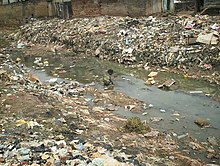World Toilet Day
[5] World Toilet Day exists to inform, engage and inspire people to take action toward achieving this goal.
UN-Water maintains the official World Toilet Day website and chooses a special theme for each year.
In 2013, UN-Water and the "Thematic Priority Area (TPA) on Drinking Water and Basic Sanitation" received the mandate to oversee World Toilet Day each year.
[15] UN-Water manages the World Toilet Day website which promotes key issues and stories, provides communications and campaigns resources, and announces events and opportunities to participate.
[17] Ultimately, the aim is to encourage organizations and governments to plan activities and action on sanitation issues to make progress on Sustainable Development Goal 6.
[16] Starting in 2012, World Toilet Day themes were selected for each year and form the basis of the related communications campaigns.
For example: The World Toilet Day campaign and related publications reach millions of people through social media, dedicated websites and other channels.
[46]: 32 On 19 November 2001, the NGO World Toilet Organization (WTO) was founded by Jack Sim, a philanthropist from Singapore.
On World Toilet Day on 19 November 2015, United Nations Secretary-General Ban Ki-moon urged broad action to renew efforts to provide access to adequate sanitation for all.
"[51] The UN Deputy Secretary-General, Jan Eliasson, was honored on World Toilet Day in 2016 in New York for his deep commitment to breaking the sanitation taboo.
[44]: 23 For example, he had delivered a video message to attendees of a WaterAid and Unilever joint event in the European Parliament on World Toilet Day 2014.
[13] The spread of many diseases (e.g. soil-transmitted helminthiasis, diarrhea, schistosomiasis) and stunted growth in children is directly related to people being exposed to human feces because toilets are either not available or not used.





